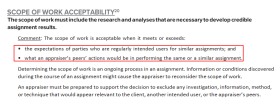Ricky LaFleur
Junior Member
- Joined
- May 11, 2020
- Professional Status
- Certified General Appraiser
- State
- Kansas
It is frustrating to hear the appraisal boards ripping an appraiser for not defining the neighborhood description how they arbitrarily would have while apparently not recognizing that evaluations have only taken hold because of the "cost prohibitive" nature of a full blown appraisal, as the lenders like to call them. For a state to make it more difficult for an appraiser to perform evaluations is really speaking out both sides of its mouth. Usually I see a bank employee doing evaluations. Don't think I've ever been asked to complete one.

